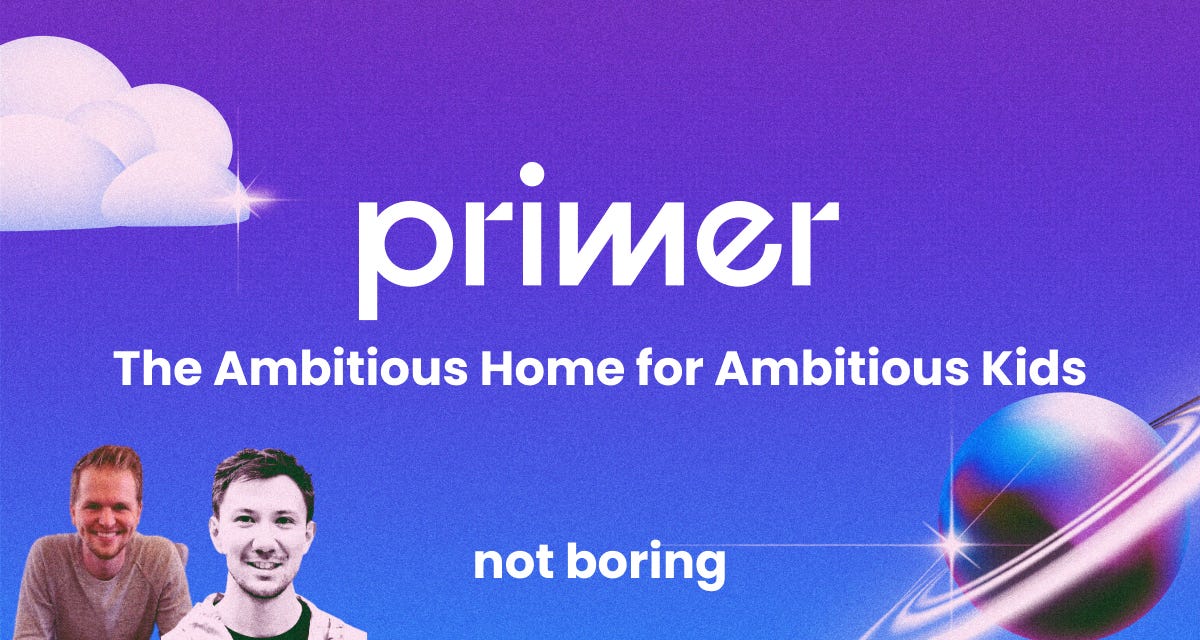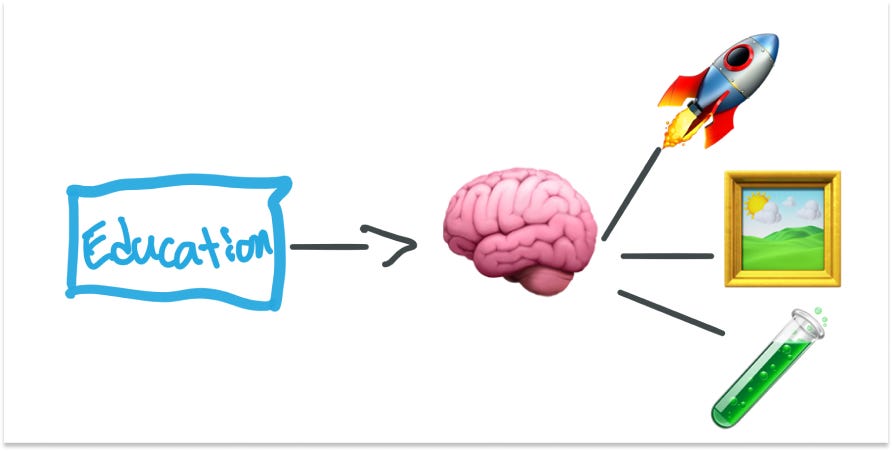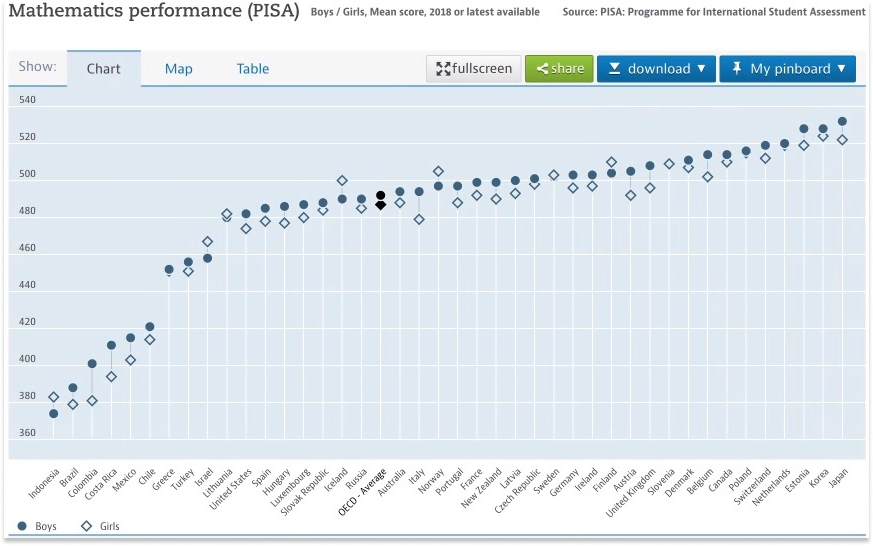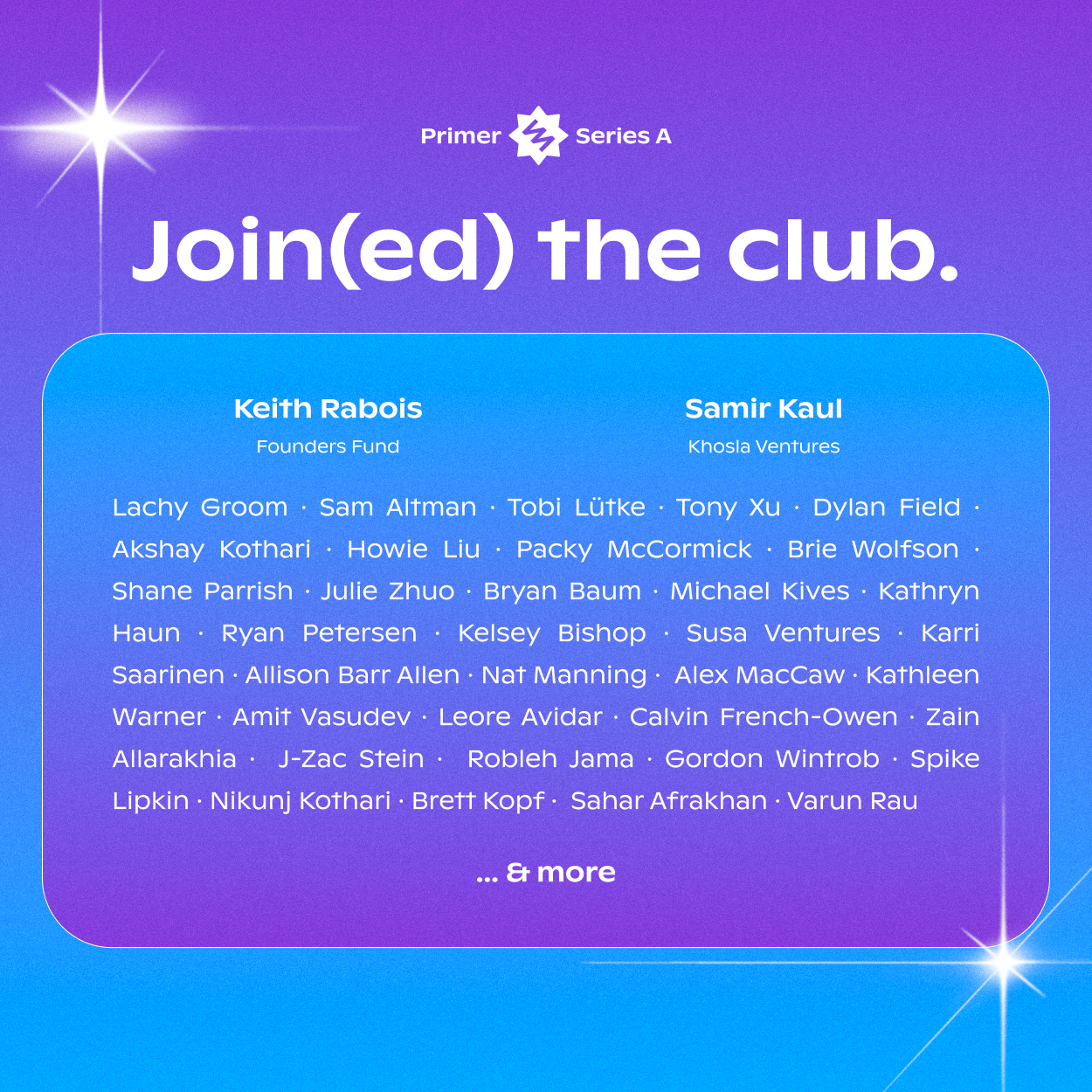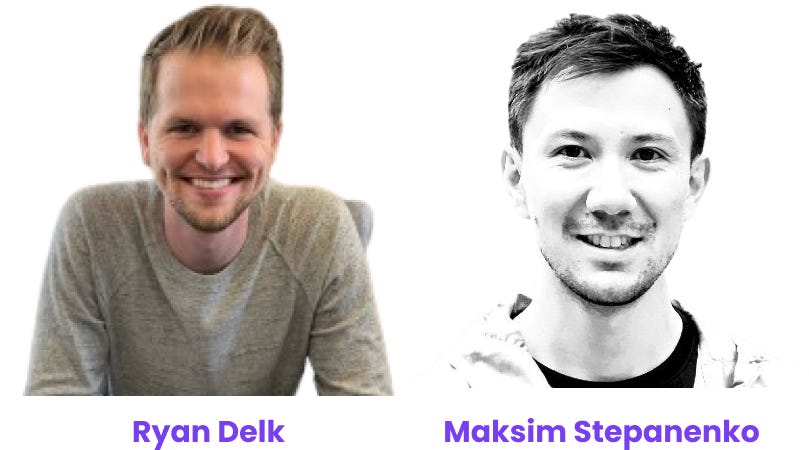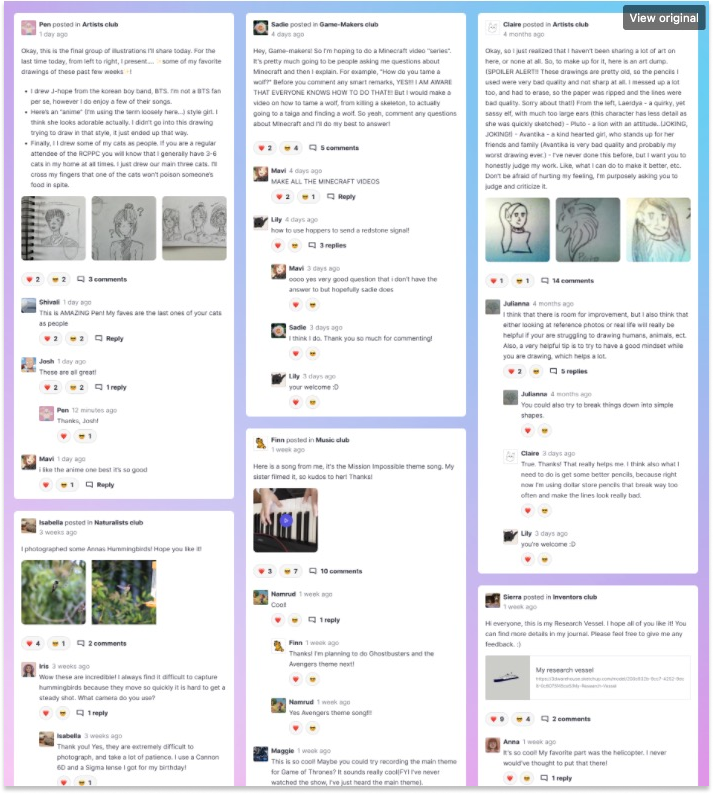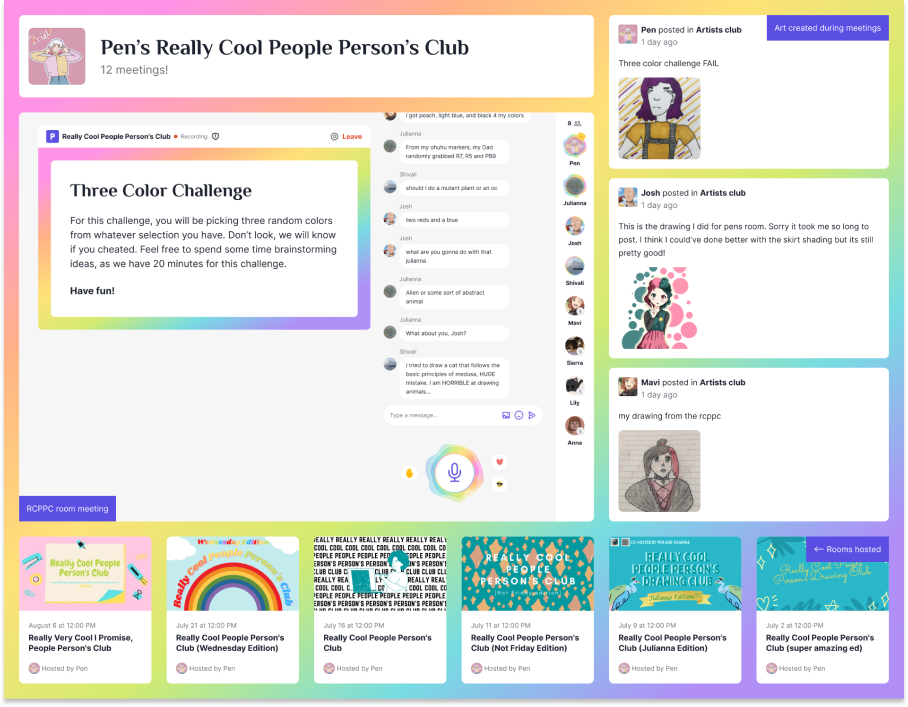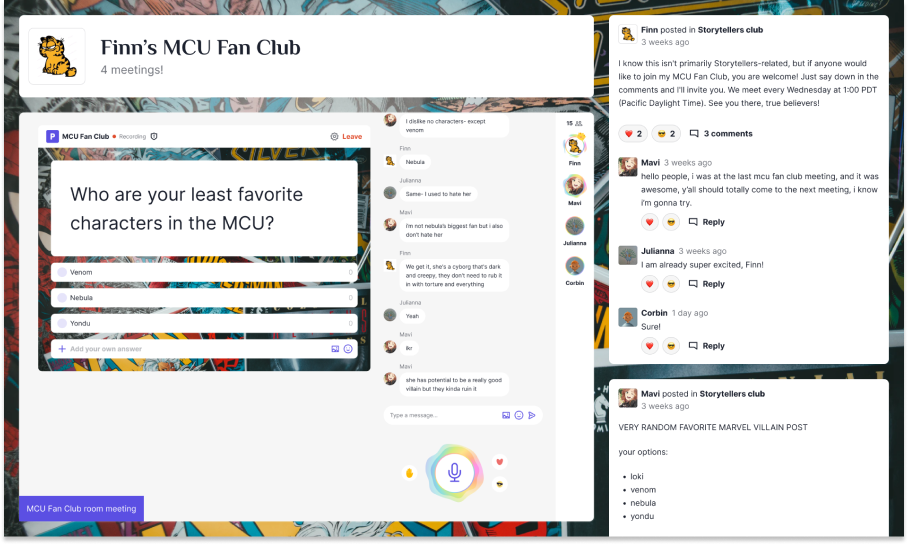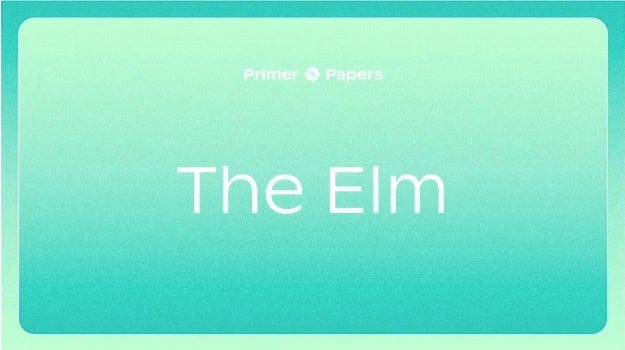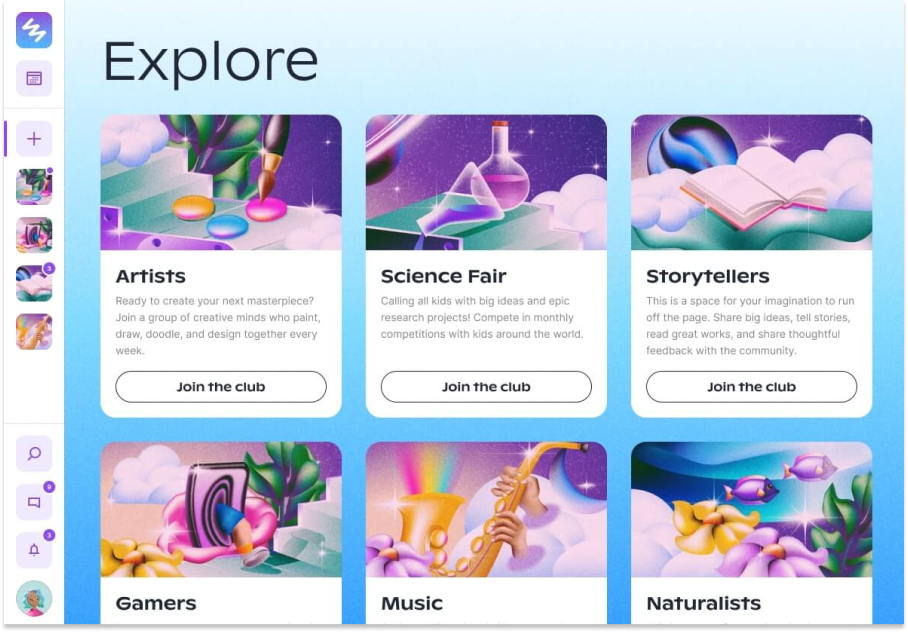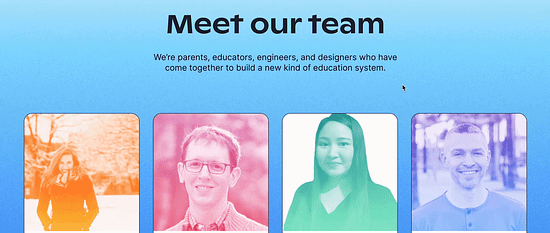Primer: The Ambitious Home for Ambitious Kids
Primer: The Ambitious Home for Ambitious KidsAnnouncing a $15M Series A, Microschools, and Expert-Led ClubsWelcome to the 931 newly Not Boring people who have joined us since Monday! If you haven’t subscribed, join 117,371 smart, curious folks by subscribing here: Hi friends 👋 , Happy Thursday! Making learning more fun is a thread that runs through Not Boring. People are naturally curious; the goal is not to kill that curiosity. So when I first met Ryan and Maksim at Primer, I fell in love with what they were building: a new education system that harnesses kids’ natural curiosity to guide more fun and deeper learning experiences. I want to see this get really big. Today is a sponsored deep dive on Primer (more on the process here). I only write about companies I would invest in, and in this case, Not Boring Capital is an investor. Let’s get to it. Primer: The Ambitious Home for Ambitious Kids(Click here 👆👆👆 to read from the top online) Now that I’ve been investing for about a year, and because I often end up spending days of my life immersed in researching and writing about the companies I invest in, I’ve started adding an additional filter to my investment process: “Who cares?” As in: if this company is wildly successful in achieving its goal, will it matter? Primer passes the test with flying colors. Primer wants to build a new education system that takes kids seriously. It’s one of the most ambitious companies I’ve encountered, which is appropriate, because it’s building the home for ambitious kids. If human progress is a function of human creativity, ingenuity, ideas, then better educating kids and empowering talented outliers might be the highest-leverage activity. It’s about time. Education has been left behind. Neal Stephenson coined the phrase “Metaverse,” in his 1992 book Snow Crash. Three years later, in 1995, he published another masterpiece, less well-known, that would go on to win the Hugo Award, science fiction’s top prize: The Diamond Age: Or, A Young Lady’s Illustrated Primer. The Diamond Age is set in the near-future, in a version of the world reshaped by advances in nanotechnology. It’s a unique vision of the future, part cyberpunk, part Victorian. Early in the story, in a conversation that would lead to the creation of the Primer, Equity Lord Alexander Chung-Sik Finkle-McGraw asks Bespoke Engineer John Percival Hackworth:
The question was rhetorical. Finkle-McGraw did not believe schools made their children’s lives interesting. So he commissioned Hackworth to create a device that would. His invention, the Young Lady’s Illustrated Primer, or “the Primer,” is an interactive, pseudo-intelligence-powered, personalized educational device that serves up stories, puzzles, and lessons that grow and evolve with the reader. One of two copies of the book transformed its owner, Nell, from the lower-class child of a single mother into the leader of her own phyle, or tribe. We’ll get into whether or not the Primer is actually the ideal enabling environment for learning in a little bit, but for now, consider this question: From the perspective of 1995, which of Stephenson’s two conceptions would you have thought we’d be more likely to have by 2022: the Metaverse or the Primer? My money would have been on the Primer, or an approximation that delivered personalized education to kids, adapting to their specific interests and learning styles and talents and pace. I would have bet on schools that make our kids’ lives more interesting. But it’s 2022 now, and it feels like we’re a lot closer to the Metaverse than the Primer. People spend enormous amounts of time online, some in rich virtual worlds, more playing the Great Online Game. Facebook, Microsoft, and other tech giants have committed to investing billions of dollars to build the Metaverse. Meanwhile, K-12 education in the United States has gotten less interesting. Education policy has focused on shrinking the gap between the top and bottom students, and the easiest way to do that is by putting a cap on the best-performing students. Already, US students are below the OECD average performance in math. And there’s no light at the end of the tunnel. California, for example, proposed regulation that would “reject the idea of naturally gifted children” and “recommended against shifting certain students into accelerated courses in middle school.” It’s no shock that confidence in public schools has tanked. In 1995, when The Diamond Age was written, 40% of Americans had “a great deal or quite a lot” of confidence in the country’s public schools, according to Gallup, down from 68% twenty years earlier, in 1975. In 2021, that number dipped to 32%, up from an even worse 29% pre-COVID. The “so what” here is both societal and personal. My son, Dev, is 18 months old, and I would do anything to make sure that he gets an education that cultivates his curiosity and builds his love for learning. Which, somehow, means that we’ve already enrolled him in a “twos” program for the fall. In the process, we met one school founder who had been a NYC public school teacher for over twenty years, and genuinely wanted to stay to make a difference in the lives of lower-income students. He finally left because he was forced to teach to the curriculum instead of creating extraordinary experiences for his students, experiences meant to pique and nurture their curiosity, despite repeated impassioned pleas. That is infuriating. The best teachers are being told they can’t create better experiences, that they need to be average. Stifling teacher creativity trickles down to student creativity. And it’s the problem that Primer is working to solve. In the November 2020 blog post introducing the world to Primer, co-founder and CEO Ryan Delk wrote:
In the same post, Primer announced it had raised a $3.7 million Seed Round led by Keith Rabois at Founders Fund and an all-star cast of angel investors including Naval Ravikant, David Perell, Balaji Srinivasan, Cyan Banister, and many more. Fast-forward 17 months. Primer has accelerated the plan. To that end, today, the company is announcing three things: a $15 million Series A, Expert-Led Clubs, and Primer Microschools. $15 Million Series A Primer has raised a $15 million Series A, led again by Keith Rabois at Founders Fund and co-led by Samir Kaul at Khosla Ventures, and joined by a stacked group of angels and top founders, including: Tobi Lütke (Shopify), Tony Xu (DoorDash), Akshay Kothari (Notion), Howie Liu (Airtable), Brie Wolfson (Stripe Press, Kool-Aid Factory), Shane Parrish (Farnam Street), Julie Zhuo (ex-VP Design at Facebook, Sundial), Amjad Masad (Replit), Max (Lattice) & Sam Altman (YC, OpenAI), Kathryn Haun (Haun Ventures), Alex Maccaw (Clearbit), Amit Vasudev (Clearbit), Leore Avidar (Alt), Ryan Petersen (Flexport), J-Zac Stein (Lattice), Dylan Field (Figma), Austin Diamond (Alongside), Brett Kopf (Remind, Omella), Karri Saarinen (Linear), Gordon Wintrob & Spike Lipkin (Newfront), and many more. I’m thrilled that Not Boring Capital participated in the round. Having that money in the bank allows Primer to step on the gas and accelerate the roadmap in a couple of core areas… Expert-Led Clubs The core of the Primer experience today is Clubs. Designed as a complement to the traditional school experience, Clubs let kids go super deep in areas they’re passionate about with kids from all over the country. They’re like extracurriculars, at online scale. Primer originally designed and ran all of the Clubs itself, but when kids started asking to run their own Clubs, Primer stood by its motto – take kids seriously – and handed over the tools. Creation is core to Primer’s mission, and kids will continue to create, launch, and run their own Clubs using Primer’s primitives. Additionally, Primer is opening up those primitives to third-parties, internet educators who’ve demonstrated an ability to educate, build community, and create content around specific interests like Chess, Writing, and Debate. Experts with large audiences will be able to use Primer’s tools to create a space for their audiences to go deeper. Imagine a version of Write of Passage for Kids, designed by Primer-investor and my first writing teacher, David Perell. Or a Socratic-Style Math Club with the founder of Feynman Mafia (this one’s actually happening in beta right now). Primer will build up a community and catalog of online experiences centered around interests, and combine them with its newest offering… Primer Microschools Primer is making the big leap from online to offline, from complement to competitor, by launching a network of Primer Microschools, starting in Miami, FL this August. Microschools are full-day, in-person schools for 10-20 students, enhanced by the larger online Primer community and digital tools. Students will spend a few hours a day on core curriculum, taught online by world-class subject educators, facilitated by on-site instructors. They’ll spend the rest of their time pursuing passions through projects, Primer Clubs, or good old fashioned unstructured exploration. The goal is to reimagine the school experience to combine what in-person schools do really well – friendships, childcare, play, and more – with what Primer’s online tools and network allow:
(The waitlist is up, by the way. If you have a 3rd - 6th grader in Miami, join here). The funding, addition of expert-led Clubs, and Primer Microschools are three important but early steps in Primer’s ultimate goal to build an engine to help kids reach their potential. It’s an idea whose time has come, built by founders whose unique educational backgrounds make them perfectly-suited for, and passionate about, the enormous challenge ahead. Today, we’ll cover how they plan to do it and why it matters:
If it succeeds, Primer has the opportunity to make a huge impact that will unfold over decades and beyond, branching out in infinite paths. It’s an alluring quest. Primer is not the first to embark upon it. The Primer and Enabling EnvironmentsIn his wonderful Notes on A Young Lady’s Illustrated Primer, Andy Matsuchak, who has done some of the most fascinating research and writing on tools for thought of anyone, writes that for many in edtech:
He concludes, however, “Unfortunately, I don’t think it’s a viable vision: The Primer isn’t a viable enabling environment.” You could spend all afternoon wandering through Matsuchak’s linked thoughts on the Primer and enabling environments – I may or may not have gone down that particular rabbit hole earlier this week – but I’ll hit you with the key points. First, what is an enabling environment?
That sounds like a good goal for a reimagined school system: to expand students’ capacity to do things they find meaningful and important; to “free kids to be more ambitious, more creative, and think for themselves.” And why isn’t the Primer a viable enabling environment? Matsuchak lays out a few reasons:
By looking at where the Primer falls short as an enabling environment, it’s possible to piece together what Primer might be able to do to create one. In fact, reading through Matsuchak’s notes, I was struck by how much his writing on enabling environments matched what Primer was building. Eerily so. Then I went back to my notes from my the first time I spoke to Ryan and Maksim, and there it was: They cited this Note from Matsuchak on Y Combinator, in which he wrote:
The YC flip is the key to the Primer model: kids are naturally passionate and curious. Start with that! Start with the things that they’re ridiculously passionate about, match them with other kids who are ridiculously passionate about them too from around the country, and then teach the core academics that help them better understand the object of their passion. It’s a new approach that’s only possible (or at least, much more feasible) with the internet. Joe Connor, the founder and CEO of EdTech startup Agora, described it like this:
Instead of a skeuomorphic translation from offline to online, Primer is designing a new educational experience from scratch, starting with intrinsic motivation and growing out from there. While that’s a novel experience for most students, it’s one that’s familiar to both of the co-founders. Both were educated in enabling environments. From Homeschool to Primer and BeyondRyan and Maksim founded Primer in 2019, based on their own educational experiences growing up. Ryan grew up in Florida. His mom was a public school teacher who wrote a paper on why homeschooling was a terrible form of education. But when she took Ryan to his first day of public Kindergarten in Florida, she figured it would be better to take him right back home and teach him there until they could find a better school. She homeschooled him for the next nine years, until he entered high school. After high school, he went to University of Florida until he dropped out to move to San Francisco and work in tech, at Gumroad and then Omni. Maksim grew up in Kyrgyzstan, where he had the opposite experience from Ryan. For starters, homeschooling was illegal in Kyrgyzstan, so Maksim went to traditional school until eighth grade. He caught a life-changing break when his high school principal noticed his passion for physics, and let him skip other classes to practice for the International Physics Olympiads. He won multiple medals for Kyrgyzstan and it changed the course of his life. He went to MIT undergrad, where he was a research assistant at the MIT Media Lab and interned at Google. After school, I kid you not, he went to work for Locu. If that sounds familiar, it’s because Locu was founded by Rene Reinsberg and Marek Olzszewski, the founders of Celo, which I wrote about on Monday. I didn’t plan this at all, just realized it now. The world works in mysterious ways. Anyway, Maksim went from Locu to Coinbase, where he spent five years before leaving in 2019. That year, On Deck’s Erik Torenberg introduced Ryan and Maksim, who were independently exploring similar idea spaces. The two decided to work on something together to give kids access to the more passion-based education that they both had. In November 2019, they founded Primer to rebuild the education system, starting with tools, products, and communities for homeschoolers. They started with homeschoolers because the space was sneaky big (about 3% of families homeschool), growing steadily (about 5% per year), underserved by technology, familiar to Ryan, and maybe most importantly, was full of families who’d opted out of the traditional system already and were looking for a better way to educate their kids. It was fortuitous timing. Four months later, COVID locked the country down, and everyone became a homeschooler in one way or another. Many parents who never planned on homeschooling were exposed to their kids’ educations firsthand when their kids sat on Zoom school at home, and realized that they needed to do something to give them better opportunities. So Primer accelerated its plans, expanding its closed beta beyond just homeschoolers. At the time, it offered a suite of products for kids, all running on top of in-house tech (no Zoom, Slack, or other third-party tools): Clubs, Rooms, and Pursuits.
Over time, a few interesting things happened. First and foremost, instead of just participating, kids wanted to create their own experiences. They wanted to host Rooms and Clubs, and so they took kids seriously and let them do it. And it was a major unlock. Pen created Pen’s Really Cool Person Club: And Finn created Finn’s Marvel Comic Universe (MCU) Fan Club: This is an example of an enabling environment in action. Primer wants kids to be more ambitious, more creative, and to think for themselves, and so they let them be ambitious, creative, and think for themselves. Plus, it gave Primer a more scalable, kid-generated content model, let the company set its sights even higher, and accelerated the roadmap. Building an Internet-Native, Online-Offline SchoolThe plan all along was to take on the final boss of the core K-12 education system and rebuild the whole thing in an internet-native way. It just wasn’t supposed to happen this fast. But Primer figured out the core social, online product – Clubs – and then raised money and then seized an opportunity to go for it early. Ambition breeds ambition. If you deconstruct a school, it’s really classes and clubs, with social interactions sprinkled throughout. Both can be supercharged by the internet. Clubs Rooms and Pursuits now live inside of Clubs, which are the white-hot core of the product. They let kids go deep on areas of interest, dream up projects, and then work on them together, learning hard skills in pursuit of a more intrinsically motivated goal. “An investigation into the Maillard reaction,” they write on the blog, “is best launched in the pursuit of the perfect chocolate chip cookie, not a chapter in a chemistry textbook.” That’s where the Cooking Club comes in. Finn’s MCU Fan Club might just be a way to bring together kids who are all interested in Marvel, which based on box office numbers is all of them, but in the process, they might learn a little bit about storytelling, worldbuilding, IP, licensing, and more. To date, Clubs have been Primer-created or Kid-created, but now that Clubs are working, they’re leaning in, opening up Clubs tools and the Primer network to third-party partners. These might be:
For partners, the opportunity seems compelling: an opportunity to find a group of passionate students without worrying about building tech or dealing with any of the compliance issues of working with kids online, all of which Primer handles. For Primer, the opportunity is to build an at-scale social product for online education. As Ryan explains it:
Plus, the more Clubs there are, the more kids will be able to pursue their specific passions, and the higher the probability that they’ll find something to be intrinsically motivated about. This piece, The Elm, was written by a 12-year-old, Sara, for the Storyteller’s Club Challenge. And finally, Clubs leverage the internet’s unique strengths: namely, kids can connect with other kids who share their passions, wherever they happen to live. The magic of the internet is that there are riches in niches, and that every niche is bigger than you’d expect. The kid who might be the only one who likes collecting worms in her school, and is an outsider because of it, might be able to join a Club full of dozens of worm collectors from all over the country. Instead of giving up on her passion to fit in, she might lean in even more and find the motivation to become a biologist and one day cure a rare disease. One parent, Josh’s mom, spoke to the power of Clubs’ global reach:
Clubs hit that elusive product-market fit. When I spoke to Ryan a month ago, Primer was all-in on Clubs. Growing Clubs – adding Kids, bringing in third-parties, building better tools to help kids and experts build rich experiences. Primer could become the best complement to traditional schools. But when you spend all day teaching kids to be ambitious, you need to practice what you preach. Miscroschools When I first talked to Ryan and Maksim last September, they told me they were trying to answer this question: What would it look like to create a space on the internet that allows kids to explore and create instead of just consume... like Minecraft or Roblox but for everything else? “At some point,” they told me, “Primer will become their school.” That “some point” was a vague, future thing that would happen once they’d nailed and scaled the online part. Then a few months ago, Ryan and Maksim met Ian, who was going through the On Deck Accelerator (ODX) and had unique ideas for launching Microschools in South Florida. “Some point” got pulled forward. They convinced him to join Primer and build the concept there instead. Ian joined last week. This is a huge decision, made quickly but easily. The beauty of building with the long-term vision in mind is that you can react quickly when opportunities present themselves ahead of schedule. So now, what might have been true in a couple years will be true in a couple months: Primer is competing with the traditional education system head-on. It’s starting small but ambitious. The team is now in an all out sprint to get the first 10 microschools with the first 100 students live by August. To put it bluntly, it’s launching a school system in four months. It’s an aggressive target, but they already have three teachers signed up and 75 students on the waitlist… in the first week. Competing with traditional schools head-on is ambitious in its own right, but the full picture emerges in the Microschools’ proposed curriculum design. Primer Microschools will be schools of 10-20 students led by a real teacher, in-person, around the United States, starting in Florida. They’ll combine the benefits of in-person interaction (and, let’s be honest, babysitting) with the scale and scope of Primer’s digital resources and community. Primer plans to use its scale to attract:
Students will show up in-person to the Microschool five days a week, for a full day each day, guided in-person by a local teacher. Without sharing too much of what happens under the hood, Primer’s model gives kids the opportunity to advance as fast as they’d like through rigorous core academics through a hybrid of in-person and virtual instruction. For the rest of the day, kids will be free to pursue their passions. They might work together with their Microschool classmates on a project, and then compete against other Microschools in the network. A Science Fair with 20 local kids is boring, but a Science Fair across all of the science-curious students in the Primer system would be motivating. Or maybe, they form their own Clubs with other Microschool or non-Microschool students on very niche topics that their local classmates don’t care about. Or maybe they get access to David Perell on writing or 3blue1brown on math or Gary Kasparov on chess. Or maybe… they just space out and think and dream and wait for inspiration to strike, without pressure to memorize some unconnected fact or take a test on State Capitals. It’s an incredibly ambitious bet, but as a parent, it’s really appealing. It combines the benefits of in-person education with the vast resources of the internet, directed by great product and world-class human teachers. “It’s important in startups to try to solve the deepest, most intense pain that your users have,” Ryan told me. “This is an opportunity to do that more quickly by giving parents a total replacement for their kid’s school versus just an online supplement.” Plus, it’s not hard to imagine that, once Microschools are established across the country and the globe, we’d be able to explore the world without taking Dev out of school. If the Classes and Clubs are online, accessible from anywhere, then the physical location is just a place to plug in and connect. That’s a champagne opportunity, though. The really powerful thing is that Primer has structured these schools such that many families can attend for free or very low out-of-pocket costs. This ingenuity opens up an opportunity to break the private-public school duopoly and deliver a best-in-class education to any kid. Maybe I have Celo on the brain, but Primer’s model reminds me a lot of regenerative education: recognizing each kid’s unique purpose and their connectedness to a larger community. Rebuilding EducationRebuilding the education system is a spectacularly large goal, and one that seems hopelessly hard after decades of public and private attempts to improve the system. Purely in-person replacements have thus far failed to make a dent at scale, at the system level. Purely tech solutions have fallen short, too. But it needs to happen. It would be a monumental tragedy if we had the internet – access to so much of the world’s information and so many of its people – and didn’t leverage it to provide more enriching educational experiences to kids, or to help them discover and connect with other kids who share their interests. If nothing else, being a nerd should be cool a lot earlier in life than it is today. The good news, as Keith Rabois likely realized, is that the education system actually perfectly fits his formula for startup success:  The US spends roughly $750 billion on the country’s 97,568 K-12 public schools, not counting private schools. The market is enormous and highly fragmented. Using the Gallup poll cited above, the public school system’s NPS is something like a -36 (it’s not apples to apples, but either way, it’s ugly). The answer, according to the formula, is to vertically integrate a solution, to combine bits and atoms, in-person and online. With today’s announcements, particularly Microschools, that’s exactly what Primer is doing. Primer isn’t alone in this mission. Two particularly promising companies I’ve come across are Higher Ground, which is mainstreaming Montessori education, and Synthesis, based on the experimental school its co-founder started for Elon at SpaceX, which “challenges young critical thinkers through complex games and simulations.” It sounds like Ender’s Game, which is very cool. Even as a Primer investor, I hope to see dozens of other innovative approaches come to market – the opportunity is enormous, and the prize for society if we get this right is orders of magnitude larger. I’m so excited about Primer specifically because of its demonstrated commitment to taking kids seriously, its high product velocity, the boldness it expressed in jumping into Microschools ahead of schedule when the opportunity presented itself, and the people who make all of that possible, the team. If you want to join them, and rebuild education, check out their jobs here. Joe Connor, who first introduced me to Ryan and Maksim, told me:
That’s the other reason that “So what?” is such an important question. Going after really big, important challenges, even if they seem nearly impossible, attracts the best people, who can help make the challenge a little less impossible. In its own Series A announcement, Primer reiterated its goal:
Primer is building a textbook enabling environment for ambitious kids, one in which kids can follow their intrinsic motivation down whichever rabbit holes it takes them. As someone who didn’t like writing book reports in school and now writes multi-thousand-word essays on topics I actually care about every week, I can attest to how powerful intrinsic motivation can be. But all of the things I write about the future won’t come true without new generations of smart, curious kids following their curiosity to solutions. And all of the things I write about the future will look quaint if we’re able to unleash kids’ enthusiasm for learning earlier in life. Education is an Archimedes Lever. If we better educate kids – maximizing their upside instead of capping their downside – and let them do important things earlier, I think the results will blow people away. In his essay that went fairytale viral, The Mystery of the Miracle Year, Dwarkesh Patel wrote about the most productive years of some of history’s greatest thinkers and scientists: Einstein, Darwin, Newton, von Neumann. They all occurred in people’s early twenties, when they had few obligations, high fluid intelligence, and the time and space to just explore their curiosities. None of them had the benefit (or, to be fair, the distraction) of the internet. None of them went through the post-1950s factory-style education system. They were free to go deep on their passions earlier in life, and compound their knowledge. I wonder what anni mirabiles we’ll unlock if we give kids a passion for learning, space to think, and the tools to go deep – solo and with other passionate kids. Ryan put it this way: “If you believe that breakthroughs that drive progress are cumulative or compounding, what happens when you get a 14-year-old girl in Birmingham, AL who’s interested in microbiology access to a lab then instead of when she’s 21?” What happens when you can find and nurture all of the outliers earlier in their lives, so that finding rare geniuses wherever they live isn’t an accident but a likelihood? What happens when you give these kids all of the wild things that other people are building — programmable money and ReFi, made-to-order rocket parts and cheap rides to space, humanity’s complete set of idea legos? As humans have wilder and wilder primitives at our disposal, we need to train the next generation to build with them, to do so passionately and creatively and responsibly. That’s the world I want Dev to grow up in, and I think Primer has the chance to help build it. If you want to be a part of making it happen, join the Primer team: If you’re in Miami and want to experience it first-hand, join the Microschool waitlist: Thanks to Ryan, Maksim, Garrett, and Joe for your conversations and contributions to this piece, and to Dan for editing. Thanks for reading, and see you on Monday, Packy If you liked this post from Not Boring by Packy McCormick, why not share it? |
Older messages
Celo: Building a Regenerative Economy
Monday, April 25, 2022
The Carbon-Negative Blockchain Making Money Beautiful
The Invisible Hand's Visible Swarm
Tuesday, April 19, 2022
Or, Why I'm Optimistic the Problems that Matter Will Get Solved
The Not Boring Liquid Super Team
Monday, April 11, 2022
Not Boring Turns Two, Fund Quarterly Update, and Growing the Team
Hadrian: Ex Machina Ad Lunam
Monday, April 4, 2022
Meet the Anti-Decline Company Building to Keep the Solar System Free
The Current Financial Thing
Monday, March 28, 2022
Everyone's a Bear. Does that mean you have to be, too?
You Might Also Like
🔮 $320B investments by Meta, Amazon, & Google!
Friday, February 14, 2025
🧠 AI is exploding already!
✍🏼 Why founders are using Playbookz
Friday, February 14, 2025
Busy founders are using Playbookz build ultra profitable personal brands
Is AI going to help or hurt your SEO?
Friday, February 14, 2025
Everyone is talking about how AI is changing SEO, but what you should be asking is how you can change your SEO game with AI. Join me and my team on Tuesday, February 18, for a live webinar where we
Our marketing playbook revealed
Friday, February 14, 2025
Today's Guide to the Marketing Jungle from Social Media Examiner... Presented by social-media-marketing-world-logo It's National Cribbage Day, Reader... Don't get skunked! In today's
Connect one-on-one with programmatic marketing leaders
Friday, February 14, 2025
Enhanced networking at Digiday events
Outsmart Your SaaS Competitors with These SEO Strategies 🚀
Friday, February 14, 2025
SEO Tip #76
Temu and Shein's Dominance Is Over [Roundup]
Friday, February 14, 2025
Hey Reader, Is the removal of the de minimis threshold a win for e-commerce sellers? With Chinese marketplaces like Shein and Temu taking advantage of this threshold, does the removal mean consumers
"Agencies are dying."
Friday, February 14, 2025
What this means for your agency and how to navigate the shift ͏ ͏ ͏ ͏ ͏ ͏ ͏ ͏ ͏ ͏ ͏ ͏ ͏ ͏ ͏ ͏ ͏ ͏ ͏ ͏ ͏ ͏ ͏ ͏ ͏ ͏ ͏ ͏ ͏ ͏ ͏ ͏ ͏ ͏ ͏ ͏ ͏ ͏ ͏ ͏ ͏ ͏ ͏ ͏ ͏ ͏
Is GEO replacing SEO?
Friday, February 14, 2025
Generative Engine Optimization (GEO) is here, and Search Engine Optimization (SEO) is under threat. But what is GEO? What does it involve? And what is in store for businesses that rely on SEO to drive
🌁#87: Why DeepResearch Should Be Your New Hire
Friday, February 14, 2025
– this new agent from OpenAI is mind blowing and – I can't believe I say that – worth $200/month
